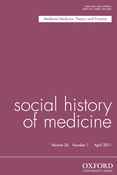-
Views
-
Cite
Cite
John Warne Monroe, Heather Wolffram, The Stepchildren of Science: Psychical Research and Parapsychology in Germany, c.1870–1939, Social History of Medicine, Volume 24, Issue 1, April 2011, Pages 203–204, https://doi.org/10.1093/shm/hkr034
Close - Share Icon Share
Extract
A multifaceted interest in paranormal phenomena was a fact of intellectual and cultural life across the West in the late nineteenth and early twentieth centuries. Despite the remarkable range and pervasiveness of this preoccupation, the historical literature on the subject has developed with a surprising geographical unevenness. While the first studies of spiritualism, psychical research and parapsychology in the Anglo-American world date from the late 1970s, studies of these developments in other European countries have only begun to appear in the last decade and a half. Heather Wolffram's monograph, The Stepchildren of Science, is a worthy contribution to this ongoing scholarly project. While in some respects it covers ground similar to Corinna Treitel's A Science for the Soul: Occultism and the Genesis of the German Modern, Wolffram's monograph provides much new detail that will be of particular value to historians of science and medicine.
Wolffram approaches late nineteenth- and early twentieth-century German attempts to create a science of the paranormal as case studies in discipline formation and the construction of authority. Though sympathetic observers perceived them as undeniably real, the multifarious phenomena mediums produced—ranging from thought transference to the extrusion of ectoplasms—were notoriously resistant to experimental scrutiny. In large part this resistance derived from the conduct of mediums, who insisted that their manifestations could only appear under certain physical and psychological conditions that were inimical to rigorous experimental control. Many mediums, for instance, required dim light, musical accompaniment, and the rigorous exclusion of sceptical observers. This elusiveness posed a serious challenge to those who wished to transform the study of paranormal phenomena into a viable science; it also gave powerful ammunition to anyone who viewed parapsychology as a dangerous foray into mysticism and superstition. As a result, Wolffram observes, from its beginnings in the late 1870s, the history of German psychical research and parapsychology was characterized by constant conflict based on competing programmes of ‘boundary work’. To establish their disciplinary legitimacy, scientific students of the paranormal sought to distinguish themselves from spiritualists, and to define their project as a form of ‘experimental psychology’. Medical doctors and academic practitioners of the new physiological psychology, which had gained a foothold in German universities in the late 1870s, responded to this effort by doing such things as denouncing the crypto-mystical aspirations of parapsychologists, critiquing their approach to experimental design, and even questioning their sanity.




